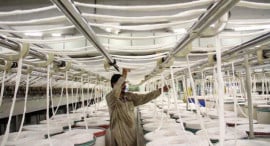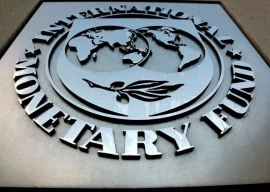
KARACHI: Experts warned that natural resources in the coastal belt are at stake and it is the prime responsibility of the government to ensure sustainable livelihood resources for the communities living along Pakistan's coastal belt.
Environmentalists, agriculturalists and social activists agreed that the coastal communities need immediate attention as climate change has directly affected them. They were discussing these issues at the launch of a position paper, titled 'Coastal Communities, Climate Change and Sustainable Alternative Livelihood', by Friends of Indus Forum (FIF) in collaboration with Climate Change Adaptation Project of the World Wide Fund for Nature - Pakistan (WWF-P) held at Marriott hotel on Wednesday.
"Climate change is a reality and we have to understand it," said the pro vice-chancellor of Sindh University Thatta campus, Dr Sarfaraz Solangi. "Temperature is rising; hence the sea level is rising. Nobody knows the future.”
Read: Citizens for a greener Karachi
Dr Solangi said the government and people themselves should be aware of the changing situation in the wake of climate change. "Our [coastal belt] area is disaster-prone." He urged the government to resolve problems faced by the communities living in the coastal belt.
According to FIF general secretary Nasir Panhwar, there is a need to explore alternative livelihood means. "We have to ensure sustainable means of livelihood," he said. He added that livelihood means are at stake because of mismanagement of resources and climate change impacts.
Environmental expert and urban planner Farhan Anwar shared details of the position paper, talking about issues such as threats to the fishing sector, climate change impacts, means of livelihoods and impacts of climate change on livelihood. He said that the fishing sector is under pressure. Overfishing, illegal use of nets, catching juvenile fish, damaging breeding habitats and pollution are some of the major reasons of the deteriorating situation.
According to the paper, Pakistan has about 1,000 kilometres of coastline and there are over a million people living there, depending on the marine and coastal natural resources for their livelihood. It is estimated that there are more than 300,000 people engaged directly in the fisheries sector. In addition to those based on coastal towns and cities, there are 27 fishing villages along the Balochistan coast and 38 along that of Sindh.
Sindh Irrigation and Drainage Authority managing director Babar Effendi, Sindh Rural Support Program chief executive Prof Mushtaque Mirani, WWF-P's Ali Dehlavi, former bureaucrats Shamsul Haq Memon and Faiz Nizamani also spoke on the occasion among others and urged the government to take measures for the vulnerable communities living along the coast.
Published in The Express Tribune, October 15th, 2015.









































COMMENTS
Comments are moderated and generally will be posted if they are on-topic and not abusive.
For more information, please see our Comments FAQ